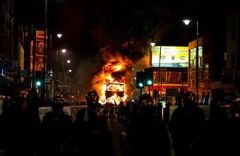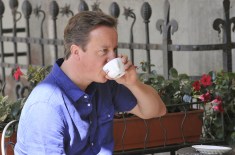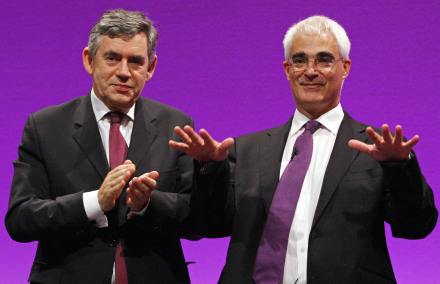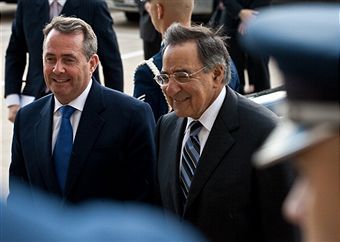Coffee House poll: What is the best method for quelling the riot?
Parliament is to be recalled on Thursday to debate the riots and the correct response to them. In the meantime, we thought we’d let CoffeeHousers have their own say:
Parliament is to be recalled on Thursday to debate the riots and the correct response to them. In the meantime, we thought we’d let CoffeeHousers have their own say:
So far as its tone went, David Cameron’s statement just now was firm and unyielding. He did express his sympathy for the victims of the riots; the emergency services, the shopkeepers, the fearful. But the major emphasis was on bringing the culprits to book. His “clear message” for the perpetrators of this destruction was that “you will feel the full force of the law”. He preceded that by describing their actions as “criminality, pure and simple — and it has to be confronted and defeated”. There were no excuses nor prevarications, and rightly so. As for the content, it seems that the government is eager to keep this a police
This was what Peckham High Street looked like at about 6.45 last night. I had heard that a bus was petrol-bombed although I neither saw nor heard evidence of that. There was no confrontation between police and the public and I didn’t see any arrests. Mostly it was just a case of people standing around wondering what, if anything, to do next.

It’s a gloomy sort of morning ritual, posting on the riots of the previous night. I’m sure CoffeeHousers have seen and heard the specifics already: further burning and looting in parts of London such as Ealing, Croydon and Hackney, as well as bursts of violence in Birmingham, Liverpool and elsewhere. Businesses and livelihoods have been obliterated, areas set back years. Among the few mercies is that no-one, so far as we know, has yet been killed as a result. One thing that’s becoming clearer through the smoke is that the Met Police are overrun, unable to properly deal with criminality at hand. The arrest figures tell a story by themselves.
There we have it: David Cameron is to return to London tonight, and chair a meeting of Cobra in the morning. There was an inevitability to the decision even earlier today, with the news that both Theresa May and Boris Johnson had curtailed their own holidays. But the fact that the riots have spread — starting in Hackney this evening, and erupting even in Birmingham — served to underline the point. It is the right decision, in any case. Cameron’s ability to control the situation may be limited, but his continued absence might only have inflamed things further. There are a lot of people scrabbling around for a grievance to
President Assad’s tanks are still doing murder on the streets of Syrian, but the dictator’s isolation grows. After weeks of prevarication, several Gulf States have closed ranks against the Syrian regime. Saudi Arabia, Bahrain, Jordan and Kuwait have all recalled their ambassadors from Damascus, and King Abdullah of Riyadh has led the Arab League’s condemnation of Assad’s ‘death machine’. Better late than never, the international consensus says. Compassion for the oppressed is not a familiar trait among Arabian princelings, but their reticence on this occasion was particularly surprising given that Assad’s Syria is no friend of the Arab League, preferring to side with Iran in most things. Still, today’s diplomatic gestures will add to the

If there’s one sentiment that defines George Osborne’s article for the Telegraph today, it’s that there is no need for us Brits to panic. The economic convulsions of the past few days, contends the Chancellor, serve to prove that the coalition was right to approach deficit reduction as it has. “The alternative of more spending and yet more borrowing is now frankly ludicrous,” he says, “and places those who advocate it on the outer fringes of the international debate.” He has a point. As I blogged on Saturday, there are reasons to believe that we’d be hurtling towards a credit downgrade and higher borrowing costs were it not for the

Even by the normal standards of Monday mornings, this one reeks. Just sniff around you. That burning smell, it’s either coming from the global stock markets as they strain against the US downgrade, or from those places in London where the rioting spread last night. Although the destruction in Brixton, Enfield, Walthamstow and Waltham Forest didn’t match up to that on Saturday in Tottenham, it still involved fires, missiles and clashes between rioters and the police. Reading the reports and watching the footage online, looting appears to have been one of the most popular sports of the evening. In terms of the short-term politics — as opposed to the slightly

Really, I expected a tidal rush of new opinion polls on the death penalty after Guido launched his campaign for its restoration last week — but, strangely, that hasn’t happened yet. There is one poll today, though, by Survation for the Mail on Sunday. It suggests that 53 per cent of people support the death penalty being reintroduced for “certain crimes”, against 34 per cent who don’t. So far as the supplementary findings go, the death penalty is more popular among older people and among Tory and UKIP voters. Almost half of all respondents believe that serious crimes would decline were the penalty reintroduced. And the three crimes deemed most

London has become used to protest recently, but there was still something terrible and unexpected in the images emerging from Tottenham last night. Here we had firebombs, missiles, riot police, burning vehicles, smashed-in shops, looting and other criminality — and it has left eight policemen injured, as well as others in hospital. The cause of the rioting was, apparently, the fatal shooting of Mark Duggan by police on Thursday. The effect was scenes reminiscent of Brixton or Broadwater Farm in the 1980s. There will be fresh attention paid to Tottenham — one of the poorest areas of one of London’s poorest boroughs — by politicians now, and rightly so. But
Why have we retained our AAA credit rating despite, by S&P’s figures, suffering a larger debt-GDP ratio than America? The Taxpayers’ Alliance’s Matthew Sinclair answers the question in some detail here, but one passage from S&P’s own analysis stands out. They explain that: “When comparing the U.S. to sovereigns with ‘AAA’ long-term ratings that we view as relevant peers–Canada, France, Germany, and the U.K.–we also observe, based on our base case scenarios for each, that the trajectory of the U.S.’s net public debt is diverging from the others. Including the U.S., we estimate that these five sovereigns will have net general government debt to GDP ratios this year ranging from


The humbling of America — the cover theme of this week’s Spectator — continues with S&P stripping Uncle Sam of his AAA credit rating. The debt downgrade, it says, “reflects our opinion that the fiscal consolidation plan that Congress and the administration recently agreed to falls short of what, in our view, would be necessary to stabilize the government’s medium-term debt dynamics.” In other words: Obama’s still addicted to debt, and it’s time to stop pretending that his government’s IOU notes rank among the safest investments on earth. Its analysis seems to be pretty much that made by Christopher Caldwell in his brilliant cover story. This move will, as today’s
A number of papers report today that George Osborne is minded to replace the 50p tax with Gordon Brown’s original proposal: a 45p tax. How the ex-PM will be laughing. As he knows, even the 45p tax will lose money — that’s why Labour didn’t raise the top rate until the final four weeks of its 13 years. But the Tories haven’t worked that out yet, and the Treasury is still working on the false assumptions he programmed into it. In short, the amount of money that either tax rate will raise depends on what’s called the “taxable income elasticity,” or TIE — a figure suggesting how responsive various taxpayers


It has, to paraphrase Margo Channing, already been a bumpy night — and it’s only going to get bumpier today. The latest news is how the Asian markets have trembled at what’s happening in the West. Japan’s main stock index is down 3.7 per cent. Australia’s is down 4.2 per cent. Hong Kong’s 5.3 per cent. And even oil futures joined in with the collective nosedive, which is continuing as the European exchanges open this morning. All of which adds to the catalogue of horror that was written yesterday. CoffeeHousers will read plenty of grim comparisons in the papers today, not least that yesterday’s plunge in the Dow Jones was
Yesterday’s defence select committee report provoked stern critiques of the government’s defence policy from Alex Massie and Matt Cavanagh. It is hard to dissent from Matt’s view that Cameron, Fox and Osborne will be defined to some extent by how they handle the defence brief, which, as Alex points out, also proved to be Gordon Brown’s undoing. It is also clear, as both Matt and Alex say, that the SDSR suggests that Britain is entering a period of ‘strategic shrinkage’, in terms of the size of the defence establishment at any rate. A political squall has erupted over this, but it’s worth pointing out that western countries are narrowing their military


The Liberal Democrats are in something of a purple patch at the moment, dominating aspects of government policy in the media. Last weekend, Danny Alexander broke his usually modest mould to stand square behind the 50p rate, in contrast to Boris Johnson and George Osborne. The debate encapsulates the current vogue for the coalition partners to accentuate their differences. Today, enter Vince Cable pursued by a mansion tax. In an interview with the Telegraph, the Business Secretary concedes that the 50p rate is not a permanent fiscal instrument, but its removal (after 2015 when the income tax threshold has been raised to £10,000) will require a concession from the Conservatives.

Sir George Young has graced the pages of the Daily Mail this morning, arguing that MPs cannot ignore the clamour for a debate on the death penalty, as examined in depth by Pete last weekend. The Leader of the House’s intervention is the greatest indication yet that parliament will discuss the issue for the first time since the passage of the Human Rights Act in 1998. This has not come as a bolt from the blue. A string of e-petitions will mature soon and capital punishment is expected to be near the top of the list, as it always is when the public is asked for its opinion. Young sees this as
Business Secretary Vince Cable was on strident form this morning, pledging to drop controversial web-blocking from the government’s plan to tackle internet piracy. But his Conservative colleagues at the Department for Culture, Media and Sport (DCMS), Ed Vaizey and Jeremy Hunt, disagree. Ed Vaizey, the minister responsible for the creative industries, is to chair a meeting on 20th September with internet service providers, copyright holders and other stakeholders, and web-blocking is on the agenda. Originally, the government proposed blocking broadband access at addresses (both real and virtual) where illegal downloads took place. The prevailing consensus suggested that such a practice is unworkable and potentially unfair: why, for instance, should a café be barred just


Yesterday’s leak of Vince Cable’s response to the Hargreaves report into the Digital Economy Act (DEA) set tongues wagging. The headline was as expected: ‘web-blocking’, the practice whereby copyright infringers are barred from internet access, will be dropped because it is unworkable. In line with Hargreaves’ recommendations, Cable also plans to remove restrictions on using copyright material to create parodies, which is excellent news for Downfall enthusiasts. And he will rationalise copyright law to legalise supposedly forbidden practices like copying CDs onto an i-Pod. Finally, Cable has permitted an exception from copyright for data mining for research purposes. The Business Department and the Treasury believe that these reforms will net the economy an extra

The House of Commons Defence Committee moves at a stately pace. Two weeks back, it gave us its considered view on the British military campaign in southern Afghanistan – a report which might have been quite useful a couple of years ago. Today it has published its verdict on October’s National Security Strategy and Strategic Defence and Security Review – nine months after their launch, with many of the decisions now irreversible, and with MPs and much of the media on holiday. The headline findings are not surprising, but make for bracing reading nonetheless. They are summarised on the front page of the Telegraph: the SDSR was a rushed exercise,